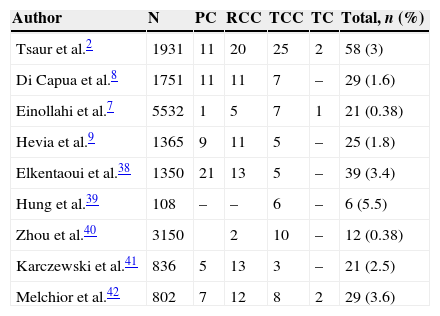The ability of a transplant recipient to accept a graft depends on the ability of immunosuppressive drugs to regulate the immune system. Such treatments have been associated with tumor promotion and progression.
Evidence acquisitionA systematic literature review was carried out. Electronic searches were performed in PubMed database. The searching criterion was “urological tumors in kidney transplant recipients”. The most important issues regarding incidence, urological tumor-specific features, and relevant ones about the treatment are summarized.
Synthesis of evidenceIn renal transplant, 15% of all tumors are urological neoplasias; furthermore, they are the leading neoplastic cause of death. In transplant population the incidence rate of renal cell carcinoma (RCC), transitional cellbladder carcinoma (TCBC), testicular carcinoma (TC) and prostate cancer are increased 15, 3, 3 and 2 times respectively. Treatments used in transplant patients are similar to those employed in the general population: radical nephrectomy for the native kidney and conservative surgery for the graft are indicated for RCC. Radical prostatectomy is technically feasible for localized PC. Regarding transitional cell carcinoma BCG or MMC is not contraindicated.
ConclusionsThe incidence rate of cancer has increased among transplant population. These tumors can be managed following the same criteria than in general population. Because in this population the prognosis is worse for the immunosuppression, closer monitoring is required.
La capacidad de un receptor para aceptar un injerto renal se debe a la regulación del sistema inmunológico por los fármacos inmunosupresores. Dichos tratamientos se han relacionado con la promoción y la progresión tumoral.
Adquisición de evidenciaSe realizó una revisión sistemática de la literatura en PubMed, de los artículos referidos a “tumores urológicos en pacientes trasplantados renales”. Se resumen los aspectos más importantes en cuanto a incidencia, características específicas de cada tumor urológico y aspectos relevantes del tratamiento.
Síntesis de evidenciaLas neoplasias urológicas representan un 15% de los tumores en el TR, además de ser en algunas series la principal causa de muerte de origen neoplásico. Dicha población tiene 15 veces más probabilidades de presentar cáncer de células renales (CCR), 3 veces de cáncer de células transicionales de vejiga (CCTV), 3 veces de cáncer testicular (CT) y 2 de cáncer de próstata (CP). Los tratamientos son similares a la población no trasplantada; en caso del CCR predomina la indicación de nefrectomía radical en el riñón nativo y cirugía conservadora en el injerto. En el CP localizado la prostatectomía radical es técnicamente factible. En el CCTV la inmunosupresión no representa una contraindicación para la administración de BCG o MMC.
ConclusionesExiste un incremento en la incidencia de tumores urológicos en la población TR. Dichos tumores se pueden abordar de la misma manera que en la población general, por lo que debido al potencial peor pronóstico en relación con la inmunosupresión se requiere en esta población específica un seguimiento más estrecho.







